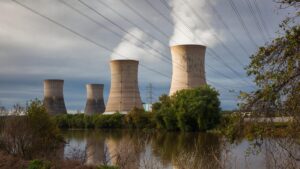Many of the Earth’s “vital signs” have hit record extremes, indicating that “the future of humanity hangs in the balance”, a group of the world’s most senior climate experts said.
More and more scientists are now looking at the possibility of societal collapse, says the report, which assessed 35 vital signs in 2023 and found that 25 were worse than ever recorded, including carbon dioxide levels and human population. This marks a “critical and unpredictable new phase of the climate crisis”, it says.
The temperature of the Earth’s surface and oceans has reached an all-time high, driven by record burning of fossil fuels, the report found. Human population is increasing at a rate of about 200,000 people per day and the number of cattle and sheep by 170,000 per day, all contributing to record greenhouse gas emissions.
The scientists identified 28 feedback loops, including increasing emissions from melting permafrost, that could help trigger multiple tipping pointssuch as the collapse of the massive Greenland ice sheet.
Global warming is increasingly driving deadly extreme weather around the world, they said, including hurricanes in the US and 50C heatwaves in India, with billions of people now exposed to extreme heat.
The scientists said their goal was “to provide clear, evidence-based insights that inspire informed and brave responses from citizens to researchers and world leaders — we just want to be honest and tell it like it is.” Decisive, swift action was essential to limit human suffering, they said, including reducing fossil fuel burning and methane emissions, reducing overconsumption and waste by the wealthy, and encouraging a shift to plant-based foods.
“We are already in the midst of sudden climate change, which threatens life on Earth like nothing humans have ever seen,” said Prof William Ripple, of Oregon State University (OSU), who co-led the group. . “Ecological overhang – taking more than the earth can safely give – has pushed the planet into climatic conditions more threatening than anything seen even by our prehistoric relatives.
“Climate change has already displaced millions of people, with the potential to displace hundreds of millions or even billions. This will likely lead to greater geopolitical instability, possibly even partial collapse of society.”
The assessment, published in the journal Biosciencesaid the concentrations of CO2 and methane in the atmosphere are at record levels. Methane is a powerful greenhouse gas, 80 times more powerful than CO2 more than 20 years, and is broadcast by fossil fuel operations, waste dumpscattle and rice fields.
“The growth rate of methane emissions has accelerated, which is extremely concerning,” said Dr. Christopher Wolf, formerly of OSU, who co-led the team.
While wind and solar energy grew by 15% in 2023, the researchers said, coal, oil and gas still dominated. They said there was “fierce resistance from those who benefit financially from the current fossil fuel-based system”.
The report includes the results of a Guardian survey of hundreds of senior climate experts in May, which found that only 6% believe the internationally agreed limit of 1.5C of warming will be met. “The fact is that it is extremely important to avoid every tenth of a degree of warming,” the researchers said. “Every tenth place a extra 100 million people in unprecedented warm average temperatures.”
The researchers said global warming is part of a larger crisis that includes pollution, the destruction of nature and growing economic inequality. “Climate change is a glaring symptom of a deeper systemic issue: ecological overshoot, [which] is an inherently unstable state that cannot continue indefinitely. As the risk of Earth’s climate system transitioning to a catastrophic state increases, more and more scientists have begun to investigate the possibility of societal collapse. Even in the absence of global collapse, climate change could cause many millions of additional deaths by 2050. We need bold, transformative change.”
Among the policies the scientists recommend for rapid adoption are the gradual reduction of the human population by empowering education and rights for girls and women; protect, restore or restore ecosystems; and integrating climate change education into global curricula to promote awareness and action.
The assessment concludes: “Only through decisive action can we protect the natural world, prevent profound human suffering and ensure that future generations inherit the livable world they deserve. The future of humanity hangs in the balance.”
The nations of the world will meet at the UN policeman 29 climate summit in Azerbaijan in November. Ripple said, “Major progress is imperative.”







